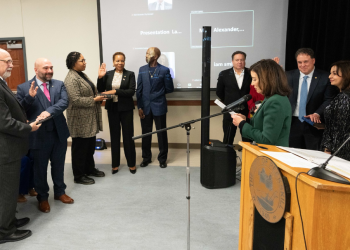A former IBM sales director has sued the Armonk-based technology giant for age discrimination, claiming she was fired as part of a pattern of replacing older employees with millennials.
 Terry Keebaugh, 57, of Alpharetta, Georgia, was fired in 2016, according to the complaint filed Dec. 21 in federal court in White Plains, one month before she was due to collect $573,000 in commissions. She got $20,000 instead.
Terry Keebaugh, 57, of Alpharetta, Georgia, was fired in 2016, according to the complaint filed Dec. 21 in federal court in White Plains, one month before she was due to collect $573,000 in commissions. She got $20,000 instead.
“IBM”™s age discrimination is longstanding and pervasive,” the complaint states, “Since 2012, IBM has implemented age-based reorganizations twice a year, sending loyal IBMers over age 50 to the chopping block while sparing younger employees.”
IBM did not respond to an email request for comment.
Keebaugh started with IBM in 1984 and worked her way up from a marketing representative to a client director on large accounts. She was assigned to disparate industries, from communications to financial services and finally to travel and transportation. Each time, the complaint states, she taught herself the skills necessary to serve her clients.
The complaint describes International Business Machines as the largest information technology employer in the world, with 366,300 employees.
Historically, according to a ProPublica article published in March and cited in the lawsuit, IBM was known for great wages and “something close to lifetime employment, all in return for unswerving loyalty.”
But fierce global competition in the 1990s put pressure on the company to trim its workforce and costs. Keebaugh traces the current practices to Virginia Rometty, who became CEO in 2012.
That year, according to the lawsuit, Rometty implemented age-based reorganizations twice a year, in which thousands of high performers over age 50 were laid off.
“Rometty”™s vision for IBM is a workforce comprised of 75 percent millennials,” Keebaugh claims.
IBM allegedly wants to shed older workers, according to the complaint, who the company thinks lack the skills needed to create and sell new products and services, such as cloud computing.
ProPublica calculated that IBM has eliminated more than 20,000 U.S. employees, 40 or older, in the past five years. Keebaugh claims that the older workers are replaced with younger people who fill the same or similar positions.
Keebaugh was even assigned to work on the Millennial Task Force, in 2015. She noticed that young replacements were not being trained to serve clients who still relied on mainframe computers, “the main technology used by hospitals, financial institutions, airports and insurance companies.”
She proposed creating a database of best practices, for training new employees in dealing with costly mainframe problems. Her idea led to a “cognitive solution” patent application.
On Aug. 30, 2016, IBM gave her an invention an achievement award for her patent application.
The next day, her boss sent her a letter stating that she was being fired as part of a “skills transformation plan,” according to the lawsuit.
She was told that she had been rated as the “lowest of the low” in skills compared with  her peers. But the company, she alleges, would not identify how or to whom she was being compared.
She claims she had never been warned, placed on probation or admonished for poor sales or substandard skills before the September letter. In fact, she states she had received the highest rating possible in her last annual performance review and her boss had praised her for delivering “the best results in the sector for the year.”
In 2015, she had more than doubled revenues from a new client, from $65 million to $135 million. When she was fired a year later, the complaint states, she had more than $100 million in contracts that were expected to close in a month.
Keebaugh says she was replaced with a younger employee who she claims has struggled to serve a key client and has generated less revenue.
She alleges that IBM shifted its explanation for why she was fired after she filed an age discrimination complaint with the Equal Employment Opportunity Commission in 2017. Now, she says, IBM says she was fired because of poor sales in newer products, including cloud, analytics, mobile, security and social technologies. Â Yet, she claims, her last performance review acknowledged her skills in the newer technologies.
Keebaugh quickly landed a new job, according to her LinkedIn profile, as a business development executive with Tata Consultancy Services in Atlanta.
In paying her $20,000 in commissions for 2016, she claims IBM cheated her out of more than $550,000. She also says she was deprived of future stock awards that had earned her $60,000 to $120,000 a year, and $15,000 in a 401(k) employer contribution.
Her lawsuit is based on alleged violations of the federal Age Discrimination in Employment Act and the New York State Human Rights Law. She is asking the court to direct IBM to take her back and pay her for the lost wages, commissions and other benefits.
She is represented by Manhattan attorneys Anne C. Vladeck and Allison L. Van Kampen.
Rather than remedy the problem, she states in the complaint”™s introduction, IBM has been standing by its discriminatory practices, “thereby ignoring a clear need for change in what may forever be remembered only as a “morally bankrupt” institution.

















